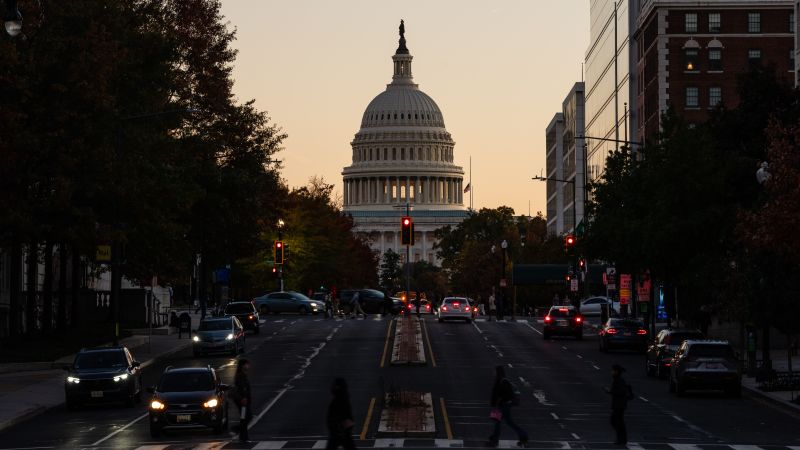Politics
Democrats Compromise to End Record Government Shutdown

The longest government shutdown in U.S. history is nearing an end following a pivotal Senate agreement reached on Sunday night. A group of moderate Democrats chose to abandon their demand for a guaranteed extension of Obamacare subsidies, allowing for a Senate vote that broke the filibuster and cleared a significant hurdle in the push to reopen the government after nearly six weeks of impasse. This compromise provides much-needed relief to millions of Americans whose lives have been disrupted by the shutdown.
The agreement, which funds the government through January 30, 2024, guarantees pay for federal workers who were furloughed and those who continued to work without pay. It also reinstates federal employees terminated during the shutdown and secures food stamp funding through 2026. Despite these measures, the compromise has sparked significant backlash from progressive members of the party. They criticize the moderates for conceding to President Donald Trump, arguing that this decision undermines the Democratic stance on healthcare affordability.
Senator Elizabeth Warren, a leading progressive voice, expressed her discontent through social media, stating, “I will not support a deal that does nothing to make health care more affordable. We are in a health care emergency.” The dissatisfaction among progressives highlights the internal fractures within the Democratic Party, as some leaders argue that this compromise reflects a major setback for their agenda.
The negotiations leading to this agreement were complex and politically charged. The shutdown originated from the expiration of enhanced subsidies for Affordable Care Act plans, leading to rising healthcare costs that have left many Americans struggling to afford insurance. The political implications of the shutdown extend beyond immediate relief; they will likely influence public sentiment leading into the 2024 midterm elections.
Senator Bernie Sanders warned that the compromise could result in what he termed a “policy and political disaster.” His concerns reflect a broader sentiment among progressives that the party is failing to stand firm against Republican pressures. The Democrats’ recent victories in gubernatorial elections in states like New Jersey and Virginia were attributed to their successful framing of Trump’s policies around the cost of living. Ironically, the first opportunity for Democrats to enact change—by fighting for healthcare affordability—was squandered, despite public opinion largely supporting their stance against the shutdown.
The compromise sets a future Senate vote on ACA subsidies for December, but it does not guarantee their extension. The likelihood of passage remains uncertain, especially given the Republican majority in the Senate. Senator Tim Kaine of Virginia, who supported the deal, asserted that the Senate vote would put pressure on Republican lawmakers to act in favor of their constituents.
Despite the mixed reactions, some Democratic leaders believe that avoiding further chaos during the holiday season is paramount. Senator John Fetterman cautioned against prolonging the shutdown, stating, “I don’t think much anything has been accomplished for the last 40 days except a lot of chaos and a lot of upheaval.” This perspective underscores the urgency of finding a resolution as the fallout from the shutdown intensifies.
The consequences of the shutdown are tangible. Millions of Americans have faced food insecurity, and federal workers have been left without paychecks. Throughout this period, Trump’s administration has appeared largely indifferent to the plight of those affected, further aggravating public dissatisfaction. As the shutdown drama unfolds, Democrats are now tasked with addressing the broader issue of healthcare costs, an area in which Republicans have yet to present a viable plan.
Moving forward, the political landscape remains fraught with challenges. The GOP is under scrutiny for its handling of healthcare subsidies, and divisions within the party could complicate future negotiations. As members return to Congress, the effectiveness of Speaker Mike Johnson and the Republican leadership will be tested.
While Trump may have emerged from this shutdown without conceding, the political ramifications of his administration’s decisions could damage his standing among voters. As public sentiment shifts, the ongoing debates about healthcare affordability and government responsibility will play a critical role in shaping the narratives leading into the midterms.
This compromise may have temporarily alleviated some immediate pressures, but it has also exposed the fragility of party unity and the ongoing struggle for a cohesive Democratic agenda. The coming months will likely reveal the true impact of this agreement, as Democrats navigate their path forward amidst internal divisions and external pressures.
-

 Top Stories1 month ago
Top Stories1 month agoRachel Campos-Duffy Exits FOX Noticias; Andrea Linares Steps In
-

 Top Stories1 week ago
Top Stories1 week agoPiper Rockelle Shatters Record with $2.3M First Day on OnlyFans
-

 Top Stories6 days ago
Top Stories6 days agoMeta’s 2026 AI Policy Sparks Outrage Over Privacy Concerns
-

 Sports5 days ago
Sports5 days agoLeon Goretzka Considers Barcelona Move as Transfer Window Approaches
-

 Top Stories1 week ago
Top Stories1 week agoUrgent Update: Denver Fire Forces Mass Evacuations, 100+ Firefighters Battling Blaze
-

 Top Stories1 week ago
Top Stories1 week agoOnlyFans Creator Lily Phillips Reconnects with Faith in Rebaptism
-

 Top Stories5 days ago
Top Stories5 days agoWarnock Joins Buddhist Monks on Urgent 2,300-Mile Peace Walk
-

 Entertainment6 days ago
Entertainment6 days agoTom Brady Signals Disinterest in Alix Earle Over Privacy Concerns
-

 Top Stories7 days ago
Top Stories7 days agoOregon Pilot and Three Niece Die in Arizona Helicopter Crash
-

 Top Stories4 days ago
Top Stories4 days agoCBS Officially Renames Yellowstone Spin-off to Marshals
-

 Health2 months ago
Health2 months agoTerry Bradshaw Updates Fans on Health After Absence from FOX NFL Sunday
-

 Sports4 days ago
Sports4 days agoSouth Carolina Faces Arkansas in Key Women’s Basketball Clash




